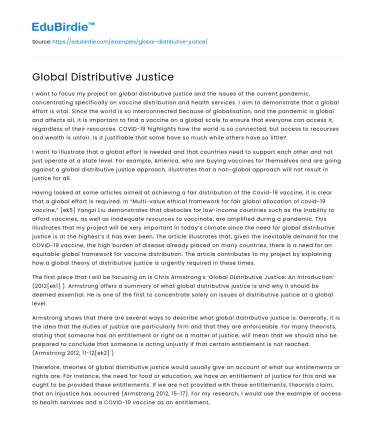I want to focus my project on global distributive justice and the issues of the current pandemic, concentrating specifically on vaccine distribution and health services. I aim to demonstrate that a global effort is vital. Since the world is so interconnected because of globalisation, and the pandemic is global and affects all, it is important to find a vaccine on a global scale to ensure that everyone can access it, regardless of their resources. COVID-19 highlights how the world is so connected, but access to recourses and wealth is unfair. Is it justifiable that some have so much while others have so little?
I want to illustrate that a global effort is needed and that countries need to support each other and not just operate at a state level. For example, America, who are buying vaccines for themselves and are going against a global distributive justice approach, illustrates that a non-global approach will not result in justice for all.
Save your time!
We can take care of your essay
- Proper editing and formatting
- Free revision, title page, and bibliography
- Flexible prices and money-back guarantee
Having looked at some articles aimed at achieving a fair distribution of the Covid-19 vaccine, it is clear that a global effort is required. In “Multi-value ethical framework for fair global allocation of covid-19 vaccine,” [ek5] Yangzi Liu demonstrates that obstacles for low-income countries such as the inability to afford vaccines, as well as inadequate resources to vaccinate, are amplified during a pandemic. This illustrates that my project will be very important in today’s climate since the need for global distributive justice is at the highest’s it has ever been. The article illustrates that, given the inevitable demand for the COVID-19 vaccine, the high burden of disease already placed on many countries, there is a need for an equitable global framework for vaccine distribution. The article contributes to my project by explaining how a global theory of distributive justice is urgently required in these times.
The first piece that I will be focusing on is Chris Armstrong’s ‘Global Distributive Justice: An Introduction’ (2012[ek1] ). Armstrong offers a summary of what global distributive justice is and why it should be deemed essential. He is one of the first to concentrate solely on issues of distributive justice at a global level.
Armstrong shows that there are several ways to describe what global distributive justice is. Generally, it is the idea that the duties of justice are particularly firm and that they are enforceable. For many theorists, stating that someone has an entitlement or right as a matter of justice, will mean that we should also be prepared to conclude that someone is acting unjustly if that certain entitlement is not reached. (Armstrong 2012, 11-12[ek2] )
Therefore, theories of global distributive justice would usually give an account of what our entitlements or rights are. For instance, the need for food or education, we have an entitlement of justice for this and we ought to be provided these entitlements. If we are not provided with these entitlements, theorists claim, that an injustice has occurred (Armstrong 2012, 15-17). For my research, I would use the example of access to health services and a COVID-19 vaccine as an entitlement, and argue that if these are not provided, then an injustice has occurred.
Armstrong illustrates that global distributive justice can vary in the content of the entitlements and duties that it suggests that one should have. For instance, some theorists suggest only basic entitlements and would therefore only have a basic set of duties. Others, on the other hand, would have a fuller range of entitlements and would thus, require more duties. (p14[ek3] -17)
He focuses on the topic of why global distributive justice is required and points to the question of whether it is because the world is so “interconnected” (Armstrong, 2012). He offers two potential responses, rational and non-relational[ek4], to this. These responses discuss the reasons why global distributive justice is crucial and this will help me in my research as I will be able to explain why it is relevant, and then I can link this concerning the current issues of COVID-19.
Armstrong also explores the two approaches of global distributive justice, a minimalistic approach, and an egalitarian approach. Minimalistic accounts imply that we should achieve for everyone in the world to have access to the conditions of a decent life. This view is not very demanding and aims for a relatively low goal.
On the other hand, an egalitarian approach argues that more needs to be done. Although it agrees with the minimalistic approach that we ought to minimise deprivation and fulfil the basic needs of everybody, it also argues that this is not enough, and we need to do more. I will be arguing for an egalitarian approach in my project and use the likes of Caney to support my conclusion.
My second piece that I have focused on is Simon Caney, he defends and articulates a cosmopolitan approach to world affairs and justifies an egalitarian account in his book, “Justice Beyond Borders: A Global Political Theory” (Caney 2005). He claims that distributive justice should be viewed from a global perspective and not just within states. This will assist my project as it will explain how it is crucial to look at the issues surrounding COVID-19 from a global perspective. He also discusses some possible criticisms of a global view and illustrates how they are unpersuasive. This will be useful because it provides some potential criticisms of which may be used against my claim that issues surrounding COVID-19 should be looked at from a global perspective. His book also addresses the issue of whether there are universal moral values exist and which principles should be used. This relates to my project in that it will offer ideas about how political theory can be used to enable global distributive justice concerning issues of COVID-19.






 Stuck on your essay?
Stuck on your essay?

